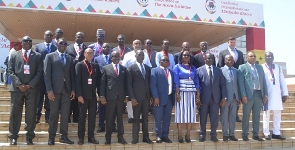The Ministerial Session of the Accra Initiative (AI) ended in Accra yesterday after further deliberations on the need for joint actions by Member States to address cross-border security issues.
The conference brought together Ministers of Security and Defence of Member States of the AI, which are Benin, Ghana, Togo, Burkina Faso, Cote d’Ivoire, Mali, and Niger.
Other participants were some representatives of the United Nations (UN) and the Economic Community for West African States (ECOWAS).
The AI was established in September 2017 as a mechanism to enhance intelligence and security cooperation between the security agencies of member states.
Its formation was necessitated by the urgent need to address the deteriorating security situation in the Sahel region and curb the southward drift of the threat of terrorism to Coastal West African States.
Opening the session, Minister for National Security, Mr. Albert Kan-Dapaah, said with strong collaboration between African countries, winning the fight against terrorism in the sub-region could be possible.
He stated that the seemingly deteriorating security situation in some African countries did not mean efforts of leaders of the affected countries to combat violent extremism were in vain.
Rather, the minister stressed that the situation could have even been worst without some interventions like intelligence sharing and capacity building, put in place to monitor situations and avert further misfortunes.
He commended the AI for its dedication to ensuring that terrorists and extremists do not take refuge in its member states.
Commissioner, of Political Affairs, peace and security of the ECOWAS Commission, Dr. Abdel-Fatau Musah, in his remarks bemoaned that terrorism was steadily gaining a foothold in the region, especially in the Sahel with the onslaught of Boko Haram in Nigeria and the southward movement towards the coastal member states especially in Benin, Togo, and Cote d’Ivoire.
He noted that the incremental gains of a combination of determined efforts by the Multinational Joint Task Force (MNJTF), counterterrorism operations across the Lake Chad Basin as well as inter terrorist conflicts which had to some extent degraded the capacities of terrorist groups such as the Boko Haram.
According to Dr. Musah, the worrisome incursion of terror acts in Benin and Togo in recent times and the attacks in Cote D’Ivoire in 2016 confirmed the spread of the terrorist menace toward coastal member states.
Over the years, various counterterrorism mechanisms, he said had emerged to respond to the terrorist threat, “Which are often uncoordinated and independent of ECOWAS.”
“It is worthy to note that the three areas of effort of the AI namely, information exchange between intelligence services and security forces, training of intelligence services and security forces, and the joint military operations at the borders of member states correspond very well for the eradication of terrorism in the ECOWAS region,” he added.
In her remarks, a representative of the UN, Ms Giovanni Biha indicated that cross border cooperation and joint military operations to address the terrorist threat had been largely possible by virtue of the commitment of member countries of the AI.
She assured of her outfit’s readiness to continually support the AI in achieving its objectives.
The Ambassador of the European Union (EU) to Ghana, Mr. Irchad Razaaly, stressed that thinking outside the box to find innovative solutions to counter terrorism in the sub-region was very necessary.
General News of Wednesday, 23 November 2022
Source: www.ghanaweb.com













